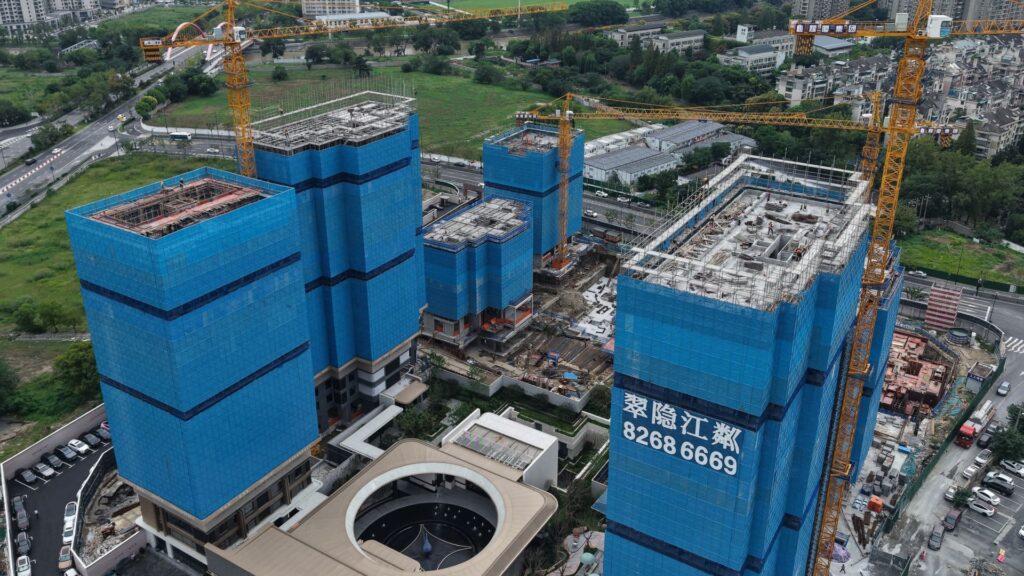A new residential complex under construction in Hangzhou City, Zhejiang Province, China on October 20, 2025.
Photo | Future Publishing | Getty Images
BEIJING – Chinese policymakers are unlikely to support the country’s struggling real estate sector, analysts told CNBC, even though the housing recession is a drag on economic growth.
The assessment comes as China’s top leaders, known as the Central Committee, are expected to conclude a four-day meeting on Thursday to outline their priorities for the next five years.
Ning Zhu, author of “China’s Guaranteed Bubble”, said that while the drag on growth in the real estate sector is easing in the Chinese government’s view, technological development is a more urgent priority in the current geopolitical situation. For him, that means the Chinese government is unlikely to enact significantly stronger real estate support.
Following long-standing concerns over real estate developers’ debts that led to a Chinese government crackdown, Chinese state media reported earlier this month that “risks in key areas have been effectively prevented and mitigated,” according to a translation by CNBC. This article was part of a series of articles highlighting the achievements of the past five years, as well as highlighting the Chinese government’s efforts to promote opportunities in the technology sector.
This highlights a further divergence between the Chinese government’s view and that of most analysts.
“The government believes the real estate market has bottomed out,” Zhu said. “I think it’s a gradual process and it could take longer to reach the bottom.”
Recent data highlights the gulf between Beijing’s optimism and market reality. China’s Bureau of Statistics said on Monday that high-tech manufacturing grew by 9.6% in the first three quarters of this year compared with the same period in 2024, outpacing the 6.2% growth in overall industrial production.
However, real estate investment fell 13.9% year-on-year in the first three quarters, and the sector’s decline continued into September. The decline pushed fixed asset investment into negative territory, the only such decline on record outside of the COVID-19 pandemic.
This means that just over a year after the Chinese government called for a “stop” to the decline in the real estate sector, there are still few signs of improvement.
Lulu See, a director at Fitch Ratings, said property prices were “hard to say when they will bottom out.” “Overall population, demographics, employment conditions, and housing market inventory are all deteriorating.”
China’s declining birthrate suggests lower future demand for housing, while uncertainty around employment and income growth is weighing on homebuyer sentiment in the short term.
Decline in house prices
Falling property prices over the past two years have also weighed on homebuyer sentiment, reversing a decades-long rally that once fueled intense speculation in the real estate market.
The weighted average price of new homes fell an annualized 2.7% month-on-month in September, according to a Goldman Sachs analysis of official data for China’s 70 largest cities released on Monday. This was larger than the 2.1% decline seen in August.
Citing a mix of official and third-party statistics, Goldman said the prices of “used” homes that have already been sold have fallen by 5% to 20% over the past year.
Looking ahead, the Chinese government is unlikely to place too much emphasis on real estate policy, whether it’s additional support or curbing real estate speculation, said Bruce Pang, adjunct associate professor at CUHK Business School.
He pointed out that China’s multi-year plans, such as for the next five years, tend to focus on new approaches to growth.
Easing measures introduced in August, including easing restrictions on multiple property purchases in major cities, had little effect on boosting sentiment. This policy change applied primarily to the city’s suburbs, rather than the most attractive downtown areas.
Citing weaker-than-expected policy support, S&P Global Ratings earlier this month predicted that real estate sales would fall 8% this year, worse than previously expected. With the market bottom still elusive, we expect the stock to decline by at least 6% next year.
Moody’s Ratings also predicts that home sales in China will decline by single digits over the next 12 to 18 months.
Daniel Chow, assistant vice president and analyst at Moody’s Ratings, said the forecast was based on waning demand from buyers who had expected policy easing. He said the real estate market should gradually stabilize in the long term under existing policy measures.
broader economic impact
The real estate recession continues to weigh heavily on China’s economy, even as the role of the real estate sector has shrunk from more than a quarter of output. Real estate sales have fallen by roughly half in just a few years, but manufacturing and exports have made up for the decline.
“China’s economy remains in two-speed mode, with a weak trajectory for consumption and real estate, and a strong trajectory for exports and manufacturing,” Larry Hu, Macquarie’s chief China economist, said in a note. “This pattern will continue until policymakers can no longer rely on external demand to boost growth.”
China’s exports have remained unexpectedly strong so far this year, rising 8.3% year-on-year in September despite a 27% drop in shipments of goods to the United States.
When it comes to real estate, “it’s very difficult to see growth trends,” Shi said. “We believe there are many more policies, but it is not possible for one policy to change the entire situation.”
Ultimately, he expects more buyers to gradually return to the housing market once the decline in home prices eases.



